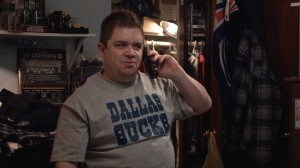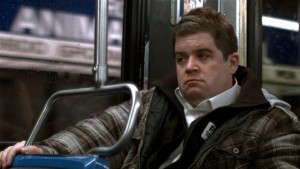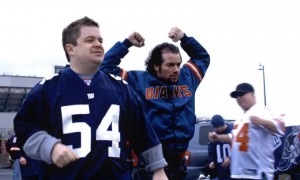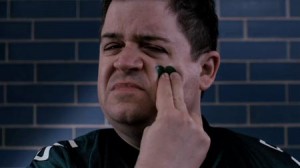Big Fan
 If Taxi Driver is considered the last movie word on how loners slowly lose their grip on reality and devolve into misguided violent martyrdom, where do those without the gaul or stones to engage in violent activism fit in? Surely, there’s more of the type too timid or scared to act on their fantasies, otherwise there’d be far more public examples of random killings. The film for the fraidy-cat narcissist sociopath is Vincent Gallo’s Buffalo ’66, where Gallo’s character, Billy, just out of jail, is self-conscious and desperate to impress, while still maintaining the cool that he perceives his past to be made up of. Since Buffalo ’66 is made from Billy’s perspective, the fractured, distorted, and jumbled reality presented is funny and sad in equal measure, ending in a fantasy sequence wherein Billy murders his nemesis in a strip club, former Buffalo Bills kicker Scott (Nor)Woods.
If Taxi Driver is considered the last movie word on how loners slowly lose their grip on reality and devolve into misguided violent martyrdom, where do those without the gaul or stones to engage in violent activism fit in? Surely, there’s more of the type too timid or scared to act on their fantasies, otherwise there’d be far more public examples of random killings. The film for the fraidy-cat narcissist sociopath is Vincent Gallo’s Buffalo ’66, where Gallo’s character, Billy, just out of jail, is self-conscious and desperate to impress, while still maintaining the cool that he perceives his past to be made up of. Since Buffalo ’66 is made from Billy’s perspective, the fractured, distorted, and jumbled reality presented is funny and sad in equal measure, ending in a fantasy sequence wherein Billy murders his nemesis in a strip club, former Buffalo Bills kicker Scott (Nor)Woods.
Robert Siegel’s Big Fan doesn’t just use the football-obsessed fan, the strip-club violence, or the paranoid OCD character focused on the most meaningless minutia from Buffalo ’66, he even takes the idea of the mumbly, insecure best friend, played by Kevin Corrigan in both films. Big Fan doesn’t have the reversal stock look of Buffalo ’66, nor anything as odd and beautiful as Christina Ricci’s impromptu bowling alley tap-dance, but it is believably unpleasant. Patton Oswalt’s convincing performance as Paul, a parking lot attendant obsessed with the NY Giants, so much so that he calls into late night sports shows and reads from a prepared script (since he doesn’t have any other way of showing off his inner anger and bluster), is littered with the kind of crucial details that weren’t important to Vincent Gallo, because of the agitated, arrogant, and amplified state of his film.
 Big Fan is a lot more humble in its approach than Buffalo ’66, and thankfully director Siegel doesn’t allow Patton Oswalt to indulge too much in his stand-up comedy nature. Paul is frustrated and inarticulate, and punchlines only suit him if they are accidental, such as when he and Corrigan (in a very underwritten part) begin to follow their idol, Quantrell Bishop* (a name that could easily be modeled on former Giant and now convicted felon Plaxico Burress, or just lucky in its timing), from a gas station on Staten Island, to the hood, all the way to a strip club in Manhattan, and Paul, making excuses for Bishop’s less than savory venture into what is clearly a drug den, utters, “Maybe he’s here to see the Wu Tang Clan.” Paul is only funny in his element, like when he mocks his mother, whom he still lives with, about the Chinese Food condiments she’s been storing for years, referring to her as the “soy sauce squirrel.”
Big Fan is a lot more humble in its approach than Buffalo ’66, and thankfully director Siegel doesn’t allow Patton Oswalt to indulge too much in his stand-up comedy nature. Paul is frustrated and inarticulate, and punchlines only suit him if they are accidental, such as when he and Corrigan (in a very underwritten part) begin to follow their idol, Quantrell Bishop* (a name that could easily be modeled on former Giant and now convicted felon Plaxico Burress, or just lucky in its timing), from a gas station on Staten Island, to the hood, all the way to a strip club in Manhattan, and Paul, making excuses for Bishop’s less than savory venture into what is clearly a drug den, utters, “Maybe he’s here to see the Wu Tang Clan.” Paul is only funny in his element, like when he mocks his mother, whom he still lives with, about the Chinese Food condiments she’s been storing for years, referring to her as the “soy sauce squirrel.”
 Paul’s inability to move on with his life past confused hero worship is what sets his life into non-motion, and why his male ego gets bruised for all the wrong reasons, ignoring the physical punishment he takes at the hands of his idol. His asexual tendency has been re-directed into his passions for his time, despite the fact that he can’t even afford a ticket to the game (he and Corrigan watch the Giants play on TV, from the stadium’s parking lot, a clear nod to Paul’s chosen profession).
Paul’s inability to move on with his life past confused hero worship is what sets his life into non-motion, and why his male ego gets bruised for all the wrong reasons, ignoring the physical punishment he takes at the hands of his idol. His asexual tendency has been re-directed into his passions for his time, despite the fact that he can’t even afford a ticket to the game (he and Corrigan watch the Giants play on TV, from the stadium’s parking lot, a clear nod to Paul’s chosen profession).
The accuracy of the early sections of Big Fan eventually give way to Paul’s simple moral dilemma, whether he should turn in Bishop for assault, weighing against the inevitable suspension from the team, hurting their playoff chances. This conundrum takes up the weak middle section of Big Fan, wallowing in plot points (not Siegel’s specialty, as can be gleaned from his cliché heavy script for The Wrestler) and forced family arguments, noisily drowning out the disquieting momentum previously established. Big Fan recovers in the last twenty minutes, as Paul attempts to confront his demons in the most wrongheaded way possible, allowing for a Michael Rapaport cameo as a Philadelphia Eagles fan (an amusing choice, considering how stereotypically New York Rapaport is). Rapaport seems to have prepared for his brief role by adding a couple of chins to his repertoire, but it’s really Oswalt who is completely focused on establishing his delusions.
 Siegel’s ability to rein in his story and not succumbing to the doubtlessly tempting need to go over-the-top is what differentiates Big Fan from Jody Hill’s cartoonishly similar Observe and Report, where tonal inconsistency seemed to be the overall point. Hill and star Seth Rogen claimed the main character was based on Travis Bickle, even if he had been shoved into a slapstick, lowbrow comedy. Hill didn’t have the skill or patience to bring his conception off, but Siegel’s lesser ambitions suit his very dark film. Big Fan is quite an accomplishment for a movie that doesn’t want to ruffle too many feathers and just wants to fit in.
Siegel’s ability to rein in his story and not succumbing to the doubtlessly tempting need to go over-the-top is what differentiates Big Fan from Jody Hill’s cartoonishly similar Observe and Report, where tonal inconsistency seemed to be the overall point. Hill and star Seth Rogen claimed the main character was based on Travis Bickle, even if he had been shoved into a slapstick, lowbrow comedy. Hill didn’t have the skill or patience to bring his conception off, but Siegel’s lesser ambitions suit his very dark film. Big Fan is quite an accomplishment for a movie that doesn’t want to ruffle too many feathers and just wants to fit in.
* Considering the none-too-flattering presentation of football players on screen, it is absolutely stunning, that, apart from Quantrell Bishop, every other name and jersey is authentic. Usually, the NFL would be far more protective of their image.



